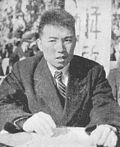Portal:North Korea
 The North Korea Portal The North Korea PortalIntroduction North Korea, officially the Democratic People's Republic of Korea (DPRK), is a country in East Asia. It constitutes the northern half of the Korean Peninsula and borders China and Russia to the north at the Yalu (Amnok) and Tumen rivers, and South Korea to the south at the Korean Demilitarized Zone. The country's western border is formed by the Yellow Sea, while its eastern border is defined by the Sea of Japan. North Korea, like its southern counterpart, claims to be the sole legitimate government of the entire peninsula and adjacent islands. Pyongyang is the capital and largest city. The Korean Peninsula was first inhabited as early as the Lower Paleolithic period. Its first kingdom was noted in Chinese records in the early 7th century BCE. Following the unification of the Three Kingdoms of Korea into Silla and Balhae in the late 7th century, Korea was ruled by the Goryeo dynasty (918–1392) and the Joseon dynasty (1392–1897). The succeeding Korean Empire (1897–1910) was annexed in 1910 into the Empire of Japan. In 1945, after the Japanese surrender at the end of World War II, Korea was divided into two zones along the 38th parallel, with the north occupied by the Soviet Union and the south occupied by the United States. In 1948, separate governments were formed in Korea: the socialist and Soviet-aligned Democratic People's Republic of Korea in the north, and the capitalist, Western-aligned Republic of Korea in the south. North Korean invasion of South Korea in 1950 started the Korean War. In 1953, the Korean Armistice Agreement brought about a ceasefire and established a demilitarized zone (DMZ), but no formal peace treaty has ever been signed. Post-war North Korea benefited greatly from economic aid and expertise provided by other Eastern Bloc countries. However, Kim Il Sung, North Korea's first leader, promoted his personal philosophy of Juche as the state ideology. Pyongyang's international isolation sharply accelerated from the 1980s onwards as the Cold War came to an end. The fall of the Soviet Union in 1991 then brought about a sharp decline to the North Korean economy. From 1994 to 1998, North Korea suffered a famine with the population continuing to suffer from malnutrition. In 2024, the DPRK formally abandoned efforts to peacefully reunify Korea. North Korea is a totalitarian dictatorship with a comprehensive cult of personality around the Kim family. Amnesty International considers the country to have the worst human rights record in the world. Officially, North Korea is an "independent socialist state" which holds democratic elections; however, outside observers have described the elections as unfair, uncompetitive, and pre-determined, in a manner similar to elections in the Soviet Union. The Workers' Party of Korea is the ruling party of North Korea. According to Article 3 of the constitution, Kimilsungism–Kimjongilism is the official ideology of North Korea. The means of production are owned by the state through state-run enterprises and collectivized farms. Most services—such as healthcare, education, housing, and food production—are subsidized or state-funded. North Korea follows Songun, a "military first" policy which prioritizes the Korean People's Army in state affairs and the allocation of resources. It possesses nuclear weapons. Its active-duty army of 1.28 million soldiers is the fourth-largest in the world. In addition to being a member of the United Nations since 1991, North Korea is also a member of the Non-Aligned Movement, G77, and the ASEAN Regional Forum. (Full article...) Selected article -The Hill 303 massacre (Korean: 303 고지 학살 사건) was a war crime that took place during the opening days of the Korean War on August 17, 1950, on a hill above Waegwan, Republic of Korea. Forty-one United States Army (US) prisoners of war were murdered by troops of the North Korean People's Army (KPA) during one of the engagements of the Battle of Pusan Perimeter. Operating near Taegu during the Battle of Taegu, elements of the US 2nd Battalion, 5th Cavalry Regiment, 1st Cavalry Division, were surrounded by KPA troops crossing the Nakdong River at Hill 303. Most of the US troops were able to escape, but one platoon of mortar operators misidentified KPA troops as Republic of Korea Army (ROK) reinforcements and was captured. KPA troops held the Americans on the hill and initially tried to move them across the river and out of the battle, but they were unable to do so because of a heavy counterattack. US forces eventually broke the KPA advance, routing the force. As the KPA began to retreat, one of their officers ordered the prisoners to be shot so they would not slow them down. The massacre provoked a response from both sides in the conflict. US commanders broadcast radio messages and dropped leaflets demanding the senior North Korean commanders be held responsible for the atrocity. The KPA commanders, concerned about the way their soldiers were treating prisoners of war, laid out stricter guidelines for handling enemy captives. Memorials were later constructed on Hill 303 by troops at nearby Camp Carroll to honor the victims of the massacre. (Full article...) CategoriesRelated portalsCommunist countries in Asia Other countries North Korea in the news
Selected image -Did you know (auto-generated)
More did you know
General images -The following are images from various North Korea-related articles on Wikipedia.
North Korea topicsThings you can do
Associated WikimediaThe following Wikimedia Foundation sister projects provide more on this subject:
Web resources
Notes Discover Wikipedia using portals |















































